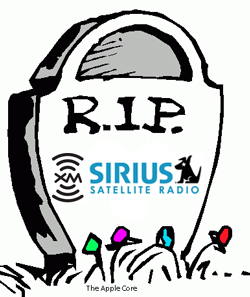Satellite Radio: put a fork in it


It is unclear how a bankruptcy would affect customers. Service is unlikely to be interrupted, but the company might have to terminate contracts with high-priced talent like Mr. Stern or Martha Stewart.
A bankruptcy would make Sirius XM one of the largest casualties of the credit squeeze. With over $5 billion in assets, it would be the second-largest Chapter 11 filing so far this year, according to Capital IQ.
it's pretty obvious that the iPhone and streaming Internet radio were contributing fators in the decline of satellite radio as I wrote in November 2008.
Why would anyone pay $13 a month for music that they can get for free via the Internet?
In many ways the satellite radio experience is inferior to streaming Internet content. Forgetting the exorbitant monthly fee (which is a deal breaker for most) satellite radio's proprietary receiver and antenna hardware are cost-prohibitive and they're completely inconvenient, tethering us to an expensive receiver with good reception to the satellites.
I subscribed to XM Radio just after it was launched in December 2001 for $10 per month and switched to Sirius in January 2006 when Howard Stern left terrestrial radio. So far, so good.
When I purchased a new vehicle in August 2008 I didn’t get Sirius factory installed because it was part of a cost prohibitive package of options. All of the external/third-party adapters for satellite radio are hideous and add unsightly docks and cradles to my otherwise pristine dashboard. No thanks.
Although I didn't get it in the car, I still periodically enjoyed Sirius Radio on the desktop thanks to Starlight, a free application created by fans tired by the horrible Web experience. When my subscription expired in December 2008, I canceled it for good.
The XM/Sirius merger touted by executives as a way to cut costs and expand business. Bullocks. I was hoping that the merger would allow me to access stations exclusive to XM (like MLB, NBA and NHL) but no such luck. Shortly after the merger I got bombarded with promotions to sign up for Sirius' offensive "best" package for another $4 per month.
The final nail in the coffin for me was the lack of an iPhone app. Sirius already had Web streaming, how hard could it be to release an app to tune in a Web stream? Although an iPhone app was promised by XM's Vernon Irvin last summer it turned out to be vaporware.
It seems like satellite radio is rooted in the greedy business model created by cable TV and CDs (remember them?) instead of embracing the era of inexpensive, ubiquitous content distributed by the Internet. Unlike the TV networks and record labels, which eventually (and begrudgingly) moved online, satellite radio never seemed to get it. Instead it consolidated, raised prices and refused to innovate.
R.I.P. satellite radio. It was fun while it lasted.